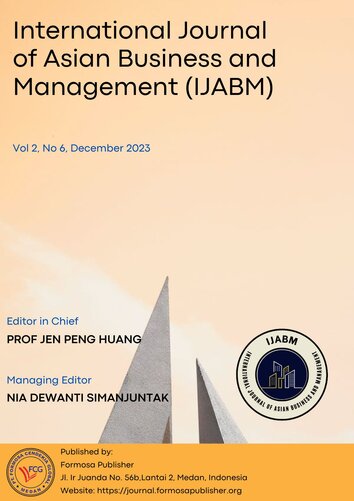Uncovering the Dimensions to Increase Islamic Job Satisfaction in Socially Nuanced Economic Institutions
DOI:
https://doi.org/10.55927/ijabm.v2i6.6235Keywords:
Islamic Job Satisfaction, Spiritiual Dimension, Social Dimension, Psychological Dimension, Economical DimensionAbstract
This study aims to explore the dimensions of Islamic Job Satisfaction that will be useful to increase Islamic job satisfaction in socially nuanced economic institutions. Samples were taken from employees of Islamic Microfinance Institutions (IMFI, LKMS, KSSPS BMT) at convenience. Data collection from 30 respondents using a questionnaire instrument was then analyzed using quantitative descriptive methods. The results showed that Islamic Job Satisfaction achieved a very high score for employees of social economic institutions (KSPPS, BMT) was very high (4,088 or 81.76%). The spiritual dimension of Islamic Job Satisfaction received the highest rating (4,386 or 87.72%), while the economic dimension received the lowest rating (3,908 or 78.16%). Future research suggestions take respondents from other socially nuanced economic institutions (educational institutions, health institutions) or other institutions (economic, governmental, social)
Downloads
References
Aflah, K. N., Suharnomo, S., Mas’ud, F., & Mursid, A. (2021). Islamic Work Ethics and Employee Performance: The Role of Islamic Motivation, Affective Commitment, and Job Satisfaction. The Journal of Asian …, 8(1), 997–1007. https://doi.org/10.13106/jafeb.2021.vol8.no1.997
Amaliah, I., Aspiranti, T., & Purnamasari, P. (2015). The Impact of the Values of Islamic Religiosity to Islamic Job Satisfaction in Tasikmalaya West Java, Indonesia, Industrial Centre. Procedia-Social and Behavioral …. https://www.sciencedirect.com/science/article/pii/S1877042815054713
Astuti, S. D., Shodikin, A., & Ud-din, M. (2020). Islamic Leadership, Islamic Work Culture, and Employee Performance: The Mediating Role of Work Motivation and Job Satisfaction. The Journal of Asian Finance, Economics and Business, 7(11), 1059–1068. https://doi.org/10.13106/jafeb.2020.vol7.no11.1059
Masyithoh, N. D. (2014). Analisis Normatif Undang-Undang No 1 Tahun 2013 Tentang Lembaga Keuangan Mikro (LKM) Atas Status Badan Hukum Dan Pengawasan Baitul Maal Wat Tamwil (BMT). Economica (Jurnal Pemikiran Dan Penelitian Ekonomi Islam), 5(2), 18–36.
Mohamad, B., Saad, H. S. M., & Ismail, S. H. S. (2014). The Role of Integrity As a Mediator Between Work Satisfaction and Work Performance in the Perspective of Islam: an Empirical Approach Using Sem/Amos Model. IMPACT: International Journal of Research in Applied, Natural and Social Sciences (IMPACT: IJRANSS), 2(1), 71–84. http://citeseerx.ist.psu.edu/viewdoc/download?doi=10.1.1.676.830&rep=rep1&type=pdf
Mustaqim. (2021). The effect of a principal’s instructional supervisory practice on teacher satisfaction in the religious ministry schools of semarang, indonesia. Journal of Social Studies Education Research, 12(1), 194–215.
Rizki, F., Armanu, T., Surachman, S., & ... (2017). Study on the relationship between Islamic leadership style, work ethics, job satisfaction, and employee performance. In Russian Journal of …. cyberleninka.ru. https://cyberleninka.ru/article/n/16967553
Romi, M. V., Ahman, E., Disman, D., Suryadi, E., & Riswanto, A. (2020). Islamic Work Ethics-Based Organizational Citizenship Behavior to Improve the Job Satisfaction and Organizational Commitment of Higher Education Lecturers in Indonesia. International Journal of Higher Education, 9(2), 78. https://doi.org/10.5430/ijhe.v9n2p78
Soleman, M. M., Armanu, A., Aisjah, S., & Sudjatno, S. (2020). Islamic job satisfaction, organizational commitment, and intention to leave: Moderating role of Islamic work ethics. Management Science Letters, 10, 1359–1368. https://doi.org/10.5267/j.msl.2019.11.021
Solikhah, Wiwoho, J., Pujiyono, & Muryanto, Y. T. (2020). The Regulatory Reconstruction Of Baitul Maal Wa Tamwil ( BMT ) Towards Efforts To Protect The Community. PSYCHOLOGY AND EDUCATION, 57(9), 2309–2315.
Wulandari, P., Kassim, S., Adikasari, L., Niken, S., & Putri, I. S. (2016). Unique aspects of Islamic microfinance financing process: experience of Baitul Maal Wa Tamwil in Indonesia. Humanomics, 32(3).
Downloads
Published
How to Cite
Issue
Section
License
Copyright (c) 2023 Wijiharta, Nur Wening

This work is licensed under a Creative Commons Attribution 4.0 International License.



















